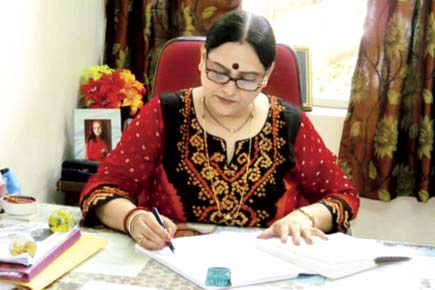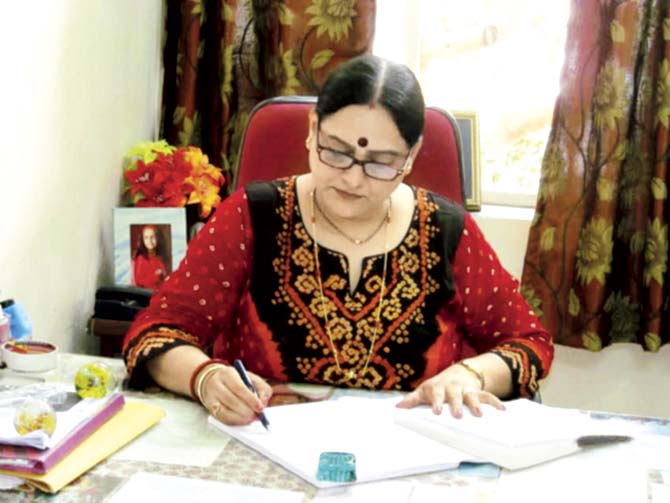Dr Urvashi Pandya speaks about her work

Dr Urvashi Pandya speaks about her work.
Q. Apart from the fact that you have worked closely on the same Kalina campus of the University of Mumbai, what were the other reasons for zeroing in on Dr Nemade’s writings as preferred material for the Gujarati reader?
Pandya: Dr Nemade is one of the most influential and original voices of twenty-first century Maharashtra. He revolutionized the form of traditional Marathi prose and autobiographical writing. There are very few writers whose influence inspires his contemporaries and the writers of successive generations, as well as those who belong to other regional linguistic cultures. There is a unique perspective heft in his novels. And his world view is as important as the language in which he puts it.
ADVERTISEMENT

Dr Urvashi Pandya
Though more known for his prose writing, his poetry too is inspiring and so is his critical appreciation of Marathi and English as two different language cultures. He has taught Marathi and English and has studied the cultural impact of English on Marathi. His Marathi help book for native English speakers is a permanent resource for anyone designing manuals for language learners. All these facets are rarely found in one thinker-writer and that’s why I have found his work so compelling.
Q. Two litterateurs from two different Indian regional sub-cultures have had a fruitful writer-translator relationship spanning over two decades?
Pandya: Yes I am personally very lucky to have such a vibrant culture connect with him. As we worked in the same University, I was privileged to get his attention. I couldn’t have asked for a better environment for my Gujarati translations. We used to have daily meetings on the campus after the lectures.
He made himself available for endless edited versions and several healthy arguments over the cultural nuances of the translated terms. Not to mention the endless cups of tea and snacks we shared during these exchanges. It was an ideal Marathi-Gujarati sammelan where each Marathi word was weighed against its Gujarati equivalent and each translated idiom was assessed in letter and spirit.
Dr Nemade’s perceptive knowledge of Gujarati and Ahirani added to the zing of the exchange. He headed the Comparative Literature department at that time and his active involvement in the actual translation added a new dimension to the University’s comparative literature modules. I feel the University’s comparative literature department gained in stature because of Dr Nemade’s presence and I don’t think it has ever managed to compensate for his departure after he retired.
The post has been oft-advertised and has had too many temporary heads. During his tenure, he attracted a rich multi-hued student base -- students who chatted in varied dialects and electrified the atmosphere with their energy. I miss that atmosphere, which could be created only by a teacher who genuinely loved the native Indian dialects. Dr Nemade has encouraged inter-lingual exchanges and I have benefitted from his guidance. During his tenure in the University, he introduced me to reading Muktabai, Janabai, Sant Dyaneshwar, Tukaram. Eknath and modern poets like Dilip Chitre and Namdeo Dhasal.
Q. So you espouse his theory of Nativism and feel equally passionate about expression in Indian languages?
Pandya: His nativism is not a narrow political outcry. It is a passionate appeal to Indians to retain their precious linguistic heritage. It connotes respect for Indian roots. Dr Nemade’s study of anthropology, history, linguistics and folklore is amazing and it supplements his theories. His worldview is based on a sound understanding of the human situation and scientific studies, which have proved that mother tongues facilitate rich and wholesome human articulation. Replacement of the mother tongue by another medium of instruction leads to poor, deficient expression.
Q. Your translations seem to have opened new doors?
Pandya: Yes and quite unexpectedly. Before coming to Mumbai in 1996, I had gone through the Gujarati translation of Kosala ( by Usha Seth). I was zapped by Dr Nemade’s innovative presentation style, be it the diary-like entries or the funny lingo spoken by the hostelite Pandurang Sangvikar. Later, I could not believe that I was working in the same Bhasha Bhavan with a cult writer who had deeply influenced me. As a translator, I couldn’t have been luckier and more blessed.
At one point, during the translation of the poems in Melody, I wanted to interchange a Gujarati folk song with the original Marathi version. I was not sure if Dr Nemade would approve of that change. But I was pleasantly surprised to not just get his permission, but he further affirmed that translation presupposes fidelity to the spirit than mere fidelity to the letter.
For me, the Marathi to Gujarati translation became educational. I came to know of the heritage of folklore and proverbs that were shared by Marathi and Gujarati cultures. Quite often I spent hours wondering over the commonality of adages in both the languages.
Q. Does your translations of Dr Nemade’s works have a definite Gujarati readership?
Pandya: The layperson is the reader, not necessarily the one who appreciates high art and culture. In fact anyone who identifies with the dilemmas of people cut off from their cultural roots will find solace in Dr Nemade’s works.
 Subscribe today by clicking the link and stay updated with the latest news!" Click here!
Subscribe today by clicking the link and stay updated with the latest news!" Click here!







